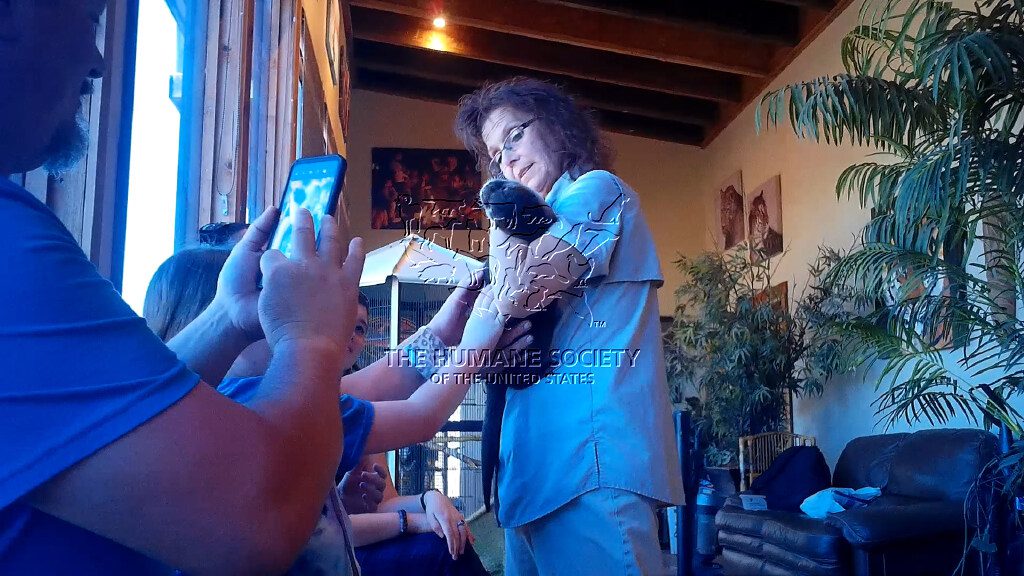TUTTLE, OKLAHOMA – Undercover footage taken at Tiger Safari in Tuttle, Okla. shows a severely distraught 6-month-old Asian small-clawed otter being used for a “VIP Encounter.” The video taken on March 28, 2021, was provided to the U.S. Department of Agriculture, the agency responsible for licensing and inspecting Tiger Safari. Having given the USDA time to look into the matter, the Humane Society of the United States is releasing the footage today to warn the public about the cruelty inflicted on animals at Tiger Safari as Americans are increasingly traveling and may be enticed to visit Tiger Safari and other roadside zoos.
The otter was heard crying behind the scenes before being brought out to meet the public. He was carried, squirming and screaming, as the handler forced him to be petted and photographed by approximately 20 paying customers. The cries were so distressing that the handler attempted to muzzle the otter with her hand. Tiger Safari owner, Bill Meadows, as well as employees conducting the encounter, ignored the otter’s evident distress.
Otters are susceptible to COVID-19, yet Tiger Safari employees were not wearing masks and even discouraged visitors from wearing masks. Just days after the video was taken, the USDA recommended that encounters with species susceptible to COVID-19—including otters—be suspended. To the best of our knowledge, Tiger Safari continues to use the otter for public encounters.
Otters are highly social, semi-aquatic animals. A staffer said that the otter was the only one at Tiger Safari and that the zoo did not have an otter exhibit. When pressed for more details by the investigator, the handler would only say “he’s got where he lives,” and walked away.
Other animals included in the VIP Encounter were a young kangaroo passed around in a bag, a ferret and a fennec fox. A handler also paraded lemurs through the group of patrons, including one who was carried upside down by his tail.
The Humane Society of the United States showed the undercover video to two highly regarded animal experts. Animal behavior authority Jay Pratte and zoo curator Christie Eddie provided extensive comment and concluded: “The [otter] is visibly struggling against the handler and can be observed pulling away from and trying to evade members of the audience. When the distress vocalizations do not diminish, that handler covers the otter’s face with her hand to attempt to muffle the sound. …The handler physically restrains the animal throughout the encounter, ignoring the clear behavioral expressions of distress.”
Lisa Wathne, manager of captive wildlife protection for the Humane Society of the United States, said: “This shabby operation shows no more concern for the otter currently being exploited than it did for the now-dead tiger cubs who were the subjects of our 2014 undercover investigation at the facility. Whether an otter cub or tiger cubs, Tiger Safari is an equal-opportunity abuser. Visitors to these horrific facilities should ask themselves, if a screaming, struggling otter being handled by apathetic workers is the public face of Tiger Safari, what goes on behind the scenes?”
Gillian Lyons, senior regulatory specialist for the Humane Society Legislative Fund, said: “We know that the USDA’s voluntary guidance for industry that COVID-susceptible animals not be used for public encounters is being ignored by numerous roadside zoos. This administration has promised to take animal welfare seriously and we hope they stick to that promise by citing Tiger Safari for the cruel handling of this young otter and by prohibiting public handling of all COVID-susceptible animals.”
